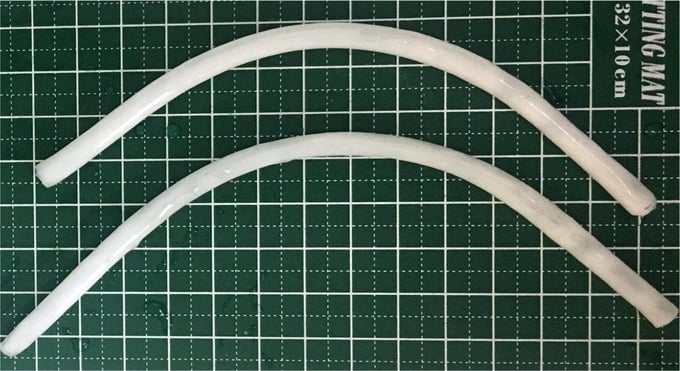June 14, 2025 | 22:54 GMT +7
June 14, 2025 | 22:54 GMT +7
Hotline: 0913.378.918
June 14, 2025 | 22:54 GMT +7
Hotline: 0913.378.918

Photo of the synthetic grafts made by the researchers. Credit: University of Waterloo
The new approach, developed and tested at the University of Waterloo, is especially important in cases involving small artificial blood vessels—those less than six millimeters in diameter—which are prone to clots that can develop into full blockages.
"There is a crucial need to develop synthetic vascular graft materials that will increase the rate of long-term functions," said Dr. Evelyn Yim, a chemical engineering professor and University Research Chair who leads the project.
Researchers added a material called fucoidan, which is made from seaweed, to modify synthetic blood vessels. Fucoidan has a structure similar to heparin, a drug used as an anticoagulant.
When applied with a nanotechnology technique known as micropatterning, fucoidan promotes the growth of vascular cells around the inner surface of the graft, significantly reducing the chances of clots forming.
For patients, the potential benefits include fewer complications, better quality of life and less risk of the recurrence of blockages requiring additional drug treatment or surgery.
"A functional, off-the-shelf, small-diameter vascular graft will help save lives," said Yim, director of the Regenerative Nanomedicine Lab at Waterloo. "What's important is that they will be much longer-lasting and allow blood to flow freely."
Bypass surgery is performed to restore blood flow to areas of the heart when vessels become blocked. Vessels harvested from the patient are the gold standard for grafts, but limited availability often requires the use of artificial vessels.
In addition to heart bypass surgery, grafts are used in medical procedures to treat vascular diseases and restore blood flow to vital organs and tissues, including the brain and legs.
When synthetic graft material doesn't allow vascular cells to grow on the inside of an artery or vessel, there is a high chance of clots, which can develop into full blockages or cause inflammation that restricts blood flow.
Yim has successfully tested the new technique using fucoidan and micropatterning on small animals and plans to expand to large animal testing before advancing to clinical trials.
Several researchers from the Department of Chemical Engineering at Waterloo and the Department of Biomedical Engineering at the Oregon Health and Science University have collaborated on this project.
A paper on the work, Fucoidan and topography modification improved in situ endothelialization on acellular synthetic vascular grafts, appears in the journal Bioactive Materials.
Seaweed, or macroalgae, refers to thousands of species of macroscopic, multicellular, marine algae. The term includes some types of Rhodophyta (red), Phaeophyta (brown) and Chlorophyta (green) macroalgae. Seaweed species such as kelps provide essential nursery habitat for fisheries and other marine species and thus protect food sources; other species, such as planktonic algae, play a vital role in capturing carbon, producing at least 50% of Earth's oxygen.
Natural seaweed ecosystems are sometimes under threat from human activity. For example, mechanical dredging of kelp destroys the resource and dependent fisheries. Other forces also threaten some seaweed ecosystems; a wasting disease in predators of purple urchins has led to a urchin population surge which destroyed large kelp forest regions off the coast of California.
Humans have a long history of cultivating seaweeds for their uses. In recent years, seaweed farming has become a global agricultural practice, providing food, source material for various chemical uses (such as carrageenan), cattle feeds and fertilizers. Because of their importance in marine ecologies and for absorbing carbon dioxide, recent attention has been on cultivating seaweeds as a potential climate change mitigation strategy for biosequestration of carbon dioxide, alongside other benefits like nutrient pollution reduction, increased habitat for coastal aquatic species, and reducing local ocean acidification. The IPCC Special Report on the Ocean and Cryosphere in a Changing Climate recommends "further research attention" as a mitigation tactic.
(Phys)

(VAN) Extensive licensing requirements raise concerns about intellectual property theft.

(VAN) As of Friday, a salmonella outbreak linked to a California egg producer had sickened at least 79 people. Of the infected people, 21 hospitalizations were reported, U.S. health officials said.

(VAN) With the war ongoing, many Ukrainian farmers and rural farming families face limited access to their land due to mines and lack the financial resources to purchase needed agricultural inputs.

(VAN) Vikas Rambal has quietly built a $5 billion business empire in manufacturing, property and solar, and catapulted onto the Rich List.

(VAN) Available cropland now at less than five percent, according to latest geospatial assessment from FAO and UNOSAT.

(VAN) Alt Carbon has raised $12 million in a seed round as it plans to scale its carbon dioxide removal work in the South Asian nation.

(VAN) Attempts to bring down the price of the Japanese staple have had little effect amid a cost-of-living crisis.